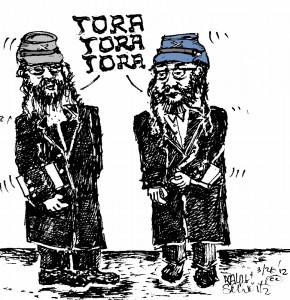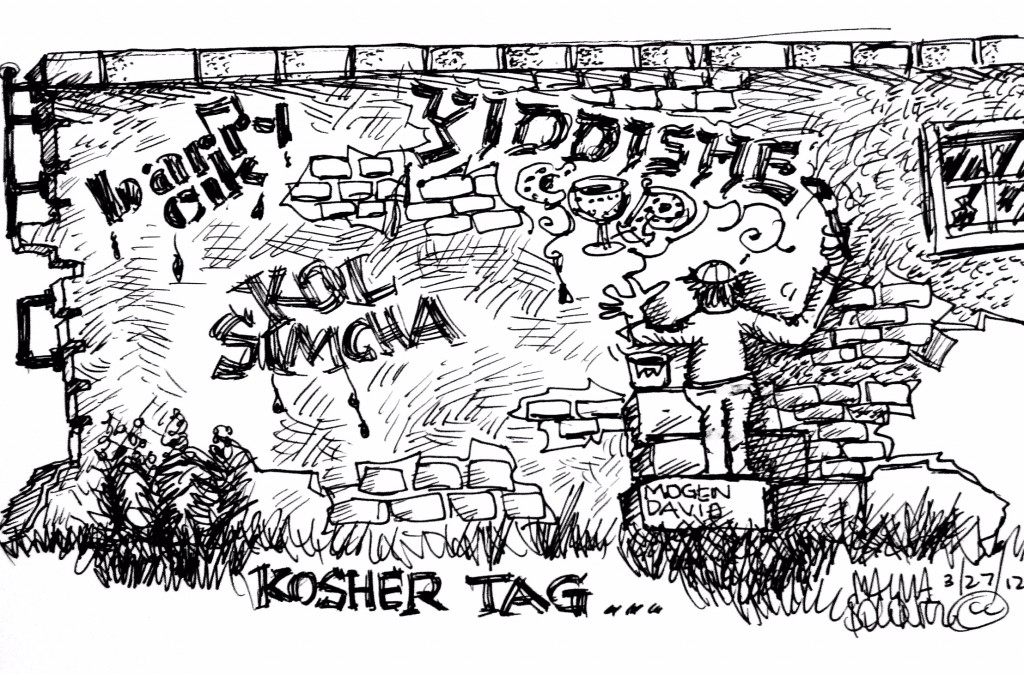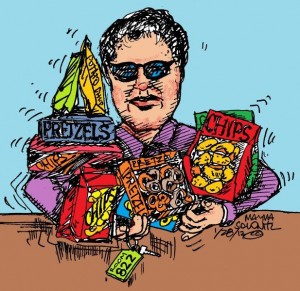Posts from — March 2012
PUNCHES WERE THROWN
Rabbi Samuel Benjamin — from my synagogue — was arrested by the cops and beat up by congregants. Then he got fired. He went off to Jerusalem.
He resurfaced stateside in Jacksonville, Florida.
This was in 1926. Rabbi Benjamin fought the great Conservative-Orthodox civil war at the Cleveland Jewish Center, East 105th Street, in the early 1920s.
Rabbi Benjamin oversaw the construction of a huge new sanctuary, complete with a swimming pool, and was supposed to keep the shul Orthodox. He tried. But the Conservatives wanted him out. Punches were thrown. One of the punchers was a certain Philip Rocker. Check it out.* The rabbi left town.
The Cleveland Jewish Center, aka the “Polish synagogue,” aka Anshe Emeth Beth Tefilo, stayed at East 105th Street for a couple decades, then moved to a park-like setting in Cleveland Heights.
I belong to the Heights shul — Park Synagogue. I do not see any signs of civil war. Very few congregants know about Rabbi Benjamin.
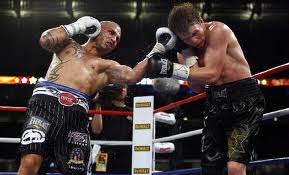 Rabbis don’t get in fights like they used to, either. Does any rabbi don boxing trunks with the Jewish star? I think there is a Russian rabbi in New York who does. [Yes, Yuri Foreman. Photo: Foreman taking a punch from Miguel Cotto.]
Rabbis don’t get in fights like they used to, either. Does any rabbi don boxing trunks with the Jewish star? I think there is a Russian rabbi in New York who does. [Yes, Yuri Foreman. Photo: Foreman taking a punch from Miguel Cotto.]
My rabbi doesn’t fight — my guess. If he does, he’s a welterweight. He’s not big.
Some rabbis play basketball. Several Cleveland rabbis played an exhibition basketball game at the Cleveland Cavaliers pre-game this month. There was no score in ten minutes.
Next year for the pre-game, the rabbis should reenact the Conservative-Orthodox civil war of 1921.
—
* “Near [Rabbi Benjamin’s] house was Philip Rocker, son of Samuel Rocker of The Jewish World. He waited for the rabbi and when he saw him he attacked him and beat him up quite severely.” From Jewish Life in Cleveland in the 1920s and 1930s by Leon Wiesenfeld, 1965.
—
SIDE B
Jumping ahead about 90 years . . .
THE JEWISH WEDDING BAND WARS, 2009
The Orthodox Jewish (OJ) music scene is centered in New York City, where most of the OJ gigs are.
An OJ band not based in New York is called an “out of town” band, even if the band plays its own hometown. There are a couple home-grown “out of town” OJ bands in Cleveland.
The Barry Cik Orchestra dominated the Orthodox Jewish Cleveland music scene in the 1980s. Cik had yikhes (lineage), coming from a long line of distinguished Hungarian musicians. I played a couple gigs with him. His talented son Yehuda became an Ortho pop star.
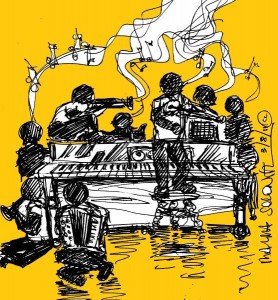 Barry Cik was superseded in Cleveland by the Kol Simcha Orchestra in the 1990s. Some bridal couples perceived Cik as not being frum (religiously observant) enough. The Orthodox world, in general, was becoming increasingly more ritually observant.
Barry Cik was superseded in Cleveland by the Kol Simcha Orchestra in the 1990s. Some bridal couples perceived Cik as not being frum (religiously observant) enough. The Orthodox world, in general, was becoming increasingly more ritually observant.
Cik placed an ad in the Cleveland Jewish Times (no longer in existence) in 1991 that read in part: “I am as scrupulous in shimras Shabbos [guarding the Sabbath] as I can be, and I don’t believe that I’m any less Shomer Shabbos [Sabbath-observant] than most anybody else.”
Cik sometimes played for non-Orthodox Jewish simchas (celebrations) with mixed dancing — men and women dancing together. Kol Simcha — the new band– typically didn’t play for mixed dancing. Kol Simcha picked up a chunk of Cik’s frummer gigs.
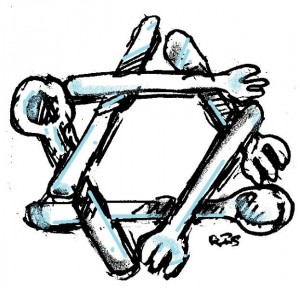 Kol Simcha’s drummer got in trouble for using treyf (non-kosher) meat at his kosher Chinese restaurant, so he left town. Still, Kol Simcha — the band — stayed in business. The lead singer, Rabbi Simcha Mann, was a very good singer.
Kol Simcha’s drummer got in trouble for using treyf (non-kosher) meat at his kosher Chinese restaurant, so he left town. Still, Kol Simcha — the band — stayed in business. The lead singer, Rabbi Simcha Mann, was a very good singer.
Several years later Simcha Mann’s expert keyboard player, Yosef Greenberger, put together a one-man band, which cut into Kol Simcha’s full-band wedding business.
Simcha Mann and Yosef Greenberger took their dispute to an unofficial beis din (house of judgment), where three rabbis decided Greenberger could keep his one-band and Rabbi Mann could have the full-band scene. The two musicians agreed not to cut into each other’s turf.
This ruling held for 13 years, 1996 to 2009.
In 2009 Greenberger and Mann remembered the ruling differently. Greenberger recalled the rabbis saying the ruling was void if new competition came to town. Greenberger’s Jewish-law counsel, his toyan, backed him up in writing. Mann disagreed.
New bands were playing Cleveland. Yosef expanded to a full band. Orthodox bands from Columbus, Ohio, and Detroit came through. A young Orthodox musician started a new Cleveland Ortho band.
Yiddishe Cup joined the fray! But Yiddishe Cup had three major flaws:
1. Yikhes (lineage/pedigree). We had none.
2. We didn’t know the OJ repertoire very well.
3. Yiddishe Cup’s name was unorthodox.
For Ortho purposes, Yiddishe Cup became Shir Perfection. (Shir is Hebrew for song.) We had an Ortho singer who knew all the Ortho tunes. We held a couple rehearsals. These get-togethers were secretly called Project O. (‘O” for Orthodox.) One musician called our project “Project Zero”; he didn’t like OrthoRock music and dropped out.
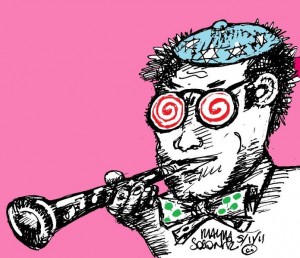 We didn’t get any gigs. We thought we might get a couple. For instance, Yiddishe Cup once played an OJ wedding for the daughter of an Orthodox blues harmonica player. The dad, who didn’t blow on shabbes, sat in with us.
We didn’t get any gigs. We thought we might get a couple. For instance, Yiddishe Cup once played an OJ wedding for the daughter of an Orthodox blues harmonica player. The dad, who didn’t blow on shabbes, sat in with us.
We were looking for Ortho gigs like that.
Still looking.
March 28, 2012 11 Comments
HE GETS PAID EXTRA
Daniel Ducoff, Yiddishe Cup’s dance leader, is the all-in-one-machine: booking agent, valet and shrink.
Daniel has a social-work master’s degree and does free counseling. For instance, when the musicians go out — like to CVS for candy bars and clubs for drinking — Ducoff hangs back with me and says: “What’s a couple extra bucks for beer and Snickers for the boys to to keep them happy? Don’t fret. ”
Daniel handles all contract negotiations. It’s not right for the bandleader to yak on the phone about “wiggle room” for the Oshkosh Opera House contract. That’s Daniel’s job.
Ducoff handles the press too. Reporters ask, “Why is this klezmer band different than all other klezmer bands?” Daniel’s answer: “Yiddishe Cup plays naked.” The reporters — shlubs who sit in cubicles all day — buy it.
Daniel, who swam competitively in high school, calls ahead for dimensions on pools at hotels. Nobody likes to pull up to an “Olympic pool” that is four raindrops.
Daniel knows his way around snack shops. Sun-baked chips are popular with the band. Daniel says, “Sun baked chips are still chips, guys. You think the sun zapped the calories out?”
Daniel knows how to find exquisite — by Midwest standards — sourdough pretzels at all Pilot and Duke truck stops.
Ducoff is also the enforcer. For example, Yiddishe Cup’s drummer, Don Friedman, occasionally blasts hard-bop jazz, like Art Blakey, inside the van. This is borderline acceptable; it gives the band a certain panache when we pull into Bob Evans in Celina, Ohio, with “Moanin’” blaring. But, Don, turn the jazz off already! That’s Ducoff’s job to tell Don.
Daniel Ducoff is the all-in-one machine.
—
This post, “He Gets Paid Extra,” is 49-percent true. It’s klez fiction.
—-
SIDE B
More klez fiction. Readers demand it. Certain readers, that is. Pete Rushefsky, a NYC klezmer musician, told me, “I don’t read any of your real estate stuff. I skip that and read the klezmer.” There are 398 klez fans in the world. They read this blog. Enjoy.
GREEN MAN GROUP
I auditioned for Green Man Group at the Cleveland home of klezmer violinist Steve Greenman.
I didn’t play clarinet for Greenman. I played my eyes. I looked maniacally Jewish, then playfully Jewish and, finally, soulfully Jewish. I thought “Einstein” the whole time.
I got a callback! Me and five other guys.
At the callback, Greenman sprayed us green and had us play fiddle patterns in E minor. This was awkward for me because E minor is a bad key for my axe — clarinet.
But I did OK.
I made it to the final audition. Me, Pete Rushefsky, tsimbl; and Jeff Warschauer, mandolin. Greenman knows us all personally. (That’s show biz.)
We didn’t get sprayed green this time, nor perform. Greenman interviewed us separately.
GREENMAN: A deer jumps on stage while you’re performing. What do you do?
STRATTON: I play “Rudolph the Red-nosed Reindeer” in E minor, then shoot the deer.
GREENMAN: A customer in a wheelchair says, “Stop talking and start playing!”
STRATTON: I say, “I’ll start playing when you stand up.”
GREENMAN: Can you make hot hors d’oeuvres pop out of your instrument?
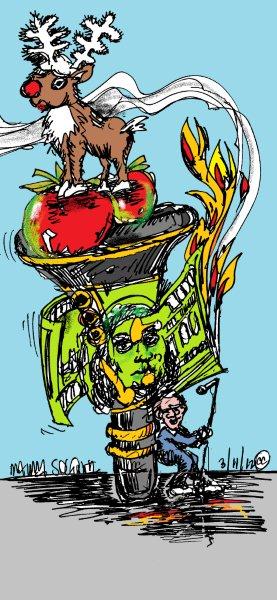 STRATTON: Yes, and candy apples on Simchat Torah.
STRATTON: Yes, and candy apples on Simchat Torah.
GREENMAN: What is the most creative thing you’ve ever done on stage?
STRATTON: I tore up a $100 bill on stage at the Omaha JCC while the audience screamed at me: “Stop, I’ll take that!” It was art.
GREENMAN: What if nobody showed up at your gig?
STRATTON: I play hard for zero people just like I play for 6,000, which is what I’m used to.
Jeff Warschauer got the job. Greenman and Warschauer are both short. Greenman didn’t want anybody taller than him on stage. That’s why I didn’t make it.
—
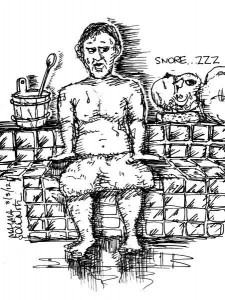 I have a piece, “For Cleveland Jews, Schvitz is Must,” in The Forward (online) this week. Check it out, or read an extended version here in a few weeks. The longer version should be better; it will contain profanity-laced, schvitzian dialogue.
I have a piece, “For Cleveland Jews, Schvitz is Must,” in The Forward (online) this week. Check it out, or read an extended version here in a few weeks. The longer version should be better; it will contain profanity-laced, schvitzian dialogue.
—
A word from Yiddishe Cup’s bandleader:
March 14, 2012 8 Comments
MY FORMER IDENTITY
When I got rid of my LP record abums, my friend Carl said, “How can you do that?”
The LPs were heavy, for one thing. And I hadn’t listened to them in 20 years. “Carl, in 10 years I might not be able to physically pitch them, ” I said. “I’ll be pointing at each one from my La-Z-Boy and making my kids choose between Bob Dylan and Charlie Parker. So I’m doing it now for my kids’ sake.”
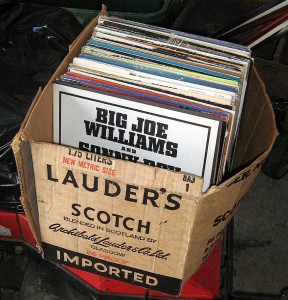
I could have put my records on the treelawn (Cleveland-
speak for the grass strip by the curb). I could have taken the LPs to a record store. Or a record store could come to me.
A record store came to me. Pete the Record Guy showed up at my house.
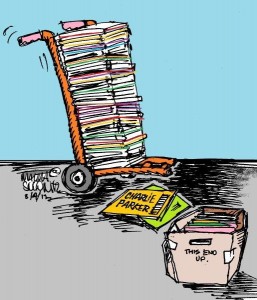 Just prior to Pete, Carl took five LPs for a wall montage. He liked Coltrane Plays the Blues, Volunteers by Jefferson Airplane, and Archie Shlepp’s Four for Trane — all good cover art. Carl, a roots-music maven, said I was in the top 5 percent of respectable record collections.
Just prior to Pete, Carl took five LPs for a wall montage. He liked Coltrane Plays the Blues, Volunteers by Jefferson Airplane, and Archie Shlepp’s Four for Trane — all good cover art. Carl, a roots-music maven, said I was in the top 5 percent of respectable record collections.
My record collection was my former identity. It was my Facebook persona, circa 1975.
I found a receipt in a Stuff Smith Black Violin album — $1.50 from Mole’s. Where was Mole’s? I don’t remember. [It was on Coventry Road in Cleveland Heights.]
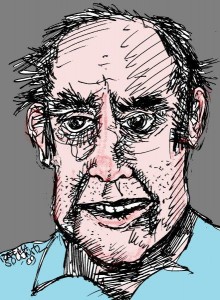
Harvey Pekar
Harvey Pekar used to rifle through my albums. The only album he ever wanted was my Charlie Parker Memorial Album, Vogue Records, England, 1956. I didn’t sell it to Harvey. I figured, If Pekar wants the record that badly, it must be worth something.
I checked on the Charlie Parker Memorial on the Internet. Today it’s worth £5.40 to an Englishman on eBay. That’s about $9. Nothing. Pekar was always into small numbers.
My kids didn’t want my albums.
I wanted to play Lenny Bruce’s “Lima, Ohio” bit (from The Best of Lenny Bruce) for Carl, but I didn’t have a record player handy. Carl said, “It’s probably on YouTube.”
Right. That’s why I got rid of my records.
Pete the Record Guy went through my albums three times. Adiós Aretha Live at the Fillmore West, John Handy’s Carnival, Paul Butterfield . . .
Let it go.
Three-hundred dollars from Pete for 100 records. Not bad. Pete didn’t care about the condition of the records. Pete said young kids –- his main customers — “won’t buy the reissue LPs, they want the originals, like yours.”
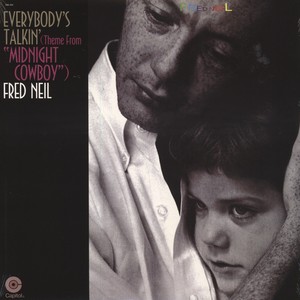 I said, “What jumped out at you? Is there any album worth 90 percent of what you paid me?”
I said, “What jumped out at you? Is there any album worth 90 percent of what you paid me?”
He said, “I like your two Fred Neil’s, Everybody’s Talkin’ and Sessions. You don’t see those often.”
“Let me take a photo. Don’t worry, Pete, I’m not taking the records back.”
—-
SIDE B
(This flip side is a little something extra for readers arriving on the A train from New York Times Square. Northerners, let’s trash the Sun Belt . . .)
ATLANTA: NOT SO HOT
Atlanta is not far enough south for some Atlantans. Right next to the Atlanta airport is a billboard “Beach Bummed?” Meaning, go to Florida.
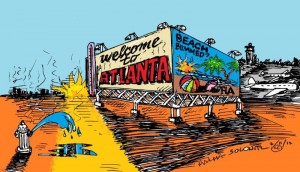
Atlanta isn’t very good for sunbathing unless you want to tan your left elbow in traffic for several hours.
I was at Atlanta airport, going through nine time zones to get to my gate. The TSA clerk, glancing at my ticket, said, “So you’re going back to beautiful Cleveland?”
Yes, sir, and it’s a lot better than Atlanta. (I didn’t say anything.) Cleveland is not Paris — or Pittsburgh, for that matter — but it’s a step up from a Southern-sprawl traffic crawl.
I’m going to Atlanta this month for a family bat mitzvah, and I have a summer gig there with Yiddishe Cup. I’ve been to the Coke Museum twice. Is there a rum-and-Coke museum in Atlanta? If so, where?
—
Atlanta relatives, nothing personal!
—
My best writing is “The Landlord’s Tale” in the latest City Journal. Please check it out. Must read long amusing essay about real estate now!
March 7, 2012 9 Comments

